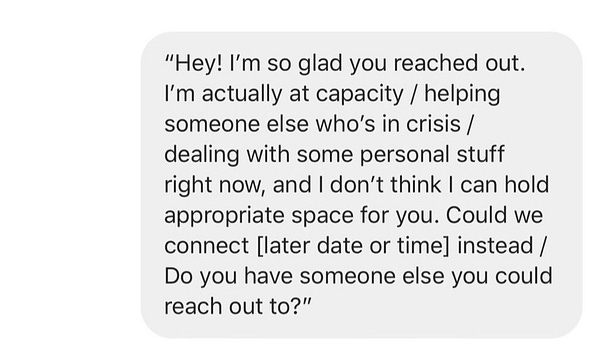Your friendships are not a commodity
On capitalism seeping its way into every aspect of our personal lives.

In this uncharted modern world we find ourselves in, there are many, many weird takes floating around the internet, especially when it comes to friendships, relationships, and general human interactions. Two examples I have seen recently come from a therapist who shared a TikTok on how to correctly break up with your friends, and an article from a woman who ranks her friends in a spreadsheet and then uses this data to track her relationships and decide who to ghost.
My first question to both of these takes was, what the fuck, and my second question, was why. Let’s take a look at these pieces of content and try to answer these questions.
How to break up with your friends.
Ending a friendship is a completely normal thing to do. It is something I have done too many times to count (lol). We’ve all had friendships that turn toxic, friendships we’ve grown out of, or people we’ve drifted apart from.
While most of us pick the obvious, though slightly rude, route of ghosting people we no longer wish to be friends with, some of us are kind enough to explain to the other person why the friendship is no longer working. Thankfully, this lovely TikTok therapist has given us a script for when we want to end a friendship this way. The video has unfortunately been deleted now, but I will gladly share the script that was given.
Friend: “I’ve noticed you’ve been withdrawn and haven’t wanted to hang out recently, what’s going on?”
Therapist: “I’ve treasured our season of friendship, but we’re moving in different directions in life. I don’t have the capacity to invest in our friendship any longer.”
Friend: “Is it something I did? This feels really sudden.”
Therapist: “I get that it might be hard to understand, but I’ve been reevaluating many areas of my life recently, including my ability to be a good friend to you. I just want to be honest and upfront so I don’t disappoint your expectations. I’m sorry if this feels painful and confusing. I wish you all love and success.”

Apart from being incredibly funny, this video is cruel, eerie, robotic, and just downright weird. My immediate reaction was the fact that her friend has to start the bloody conversation in the first place, so were you just meant to ghost your friends until they become brave and vulnerable enough to bring it up? Secondly, she does not assure her friend it wasn’t something she did. If this was me, I’d be wondering about that my entire life. Thirdly, the therapist says she doesn’t want to disappoint her friend’s expectations, of what, the existence of the FRIENDSHIP?
The therapist made a follow-up video after the incredibly hilarious backlash stating that there isn’t a right or wrong way to end a friendship. Apparently, this situation was an example of a toxic friendship in which you have had several conversations with that person, but they’re unwilling to change. It was all about context. (Not that this context was noted anywhere on the original TikTok).
Before we unpick this TikTok, let’s take a look at the second example of weird friendships, the ranking lady.
Rank your friends like you would a hotel.
A few days ago, a journalist shared a piece in the Evening Standard titled “I have a spreadsheet to rank my friends — and ghost them if they don’t perform”. Originally sent to me by my friend where we immediately started making up joke ratings (-1 for picky eaters, +1 for cat ownership) I made the unfortunate decision to read the article and I still can’t believe this is a serious piece, not something to be found on The Onion.
The spreadsheet apparently started innocently enough from a guest list on a Google document that outlines potential friendship clashes for friends who have slept together before, (Still a weird document to have, if you ask me) to a mutated document where every person she knows ends up with a ranking out of 10. Five points to describe how “fun” you are, and five for separate criteria, like unusualness, mutuality (are you inviting her to things as much as she's inviting you?), and newborn babies (you lose a point for that one).
She compares her rating system to how you will research a hotel and read some reviews before you book a holiday, or how you organise your life with a calendar, why not let data help us shape our private lives? Another reason she has this list is that she has seen people she loves be treated appallingly by “supposed friends”, so if someone on her table falls below a four, she moves them into the graveyard tab (where the ghosting commences).
There’s one excerpt of the article I cannot find the words to describe, so I thought I’d share it so you can see for yourself: “I toyed with the idea of creating an automatic emailing system embedded in my table that would send someone a note thanking them for their years of companionship and wishing them the best for the future but now I simply stop contacting them.” Eurrrrrgh.
Why?
I think that the biggest problem with these two examples is how corporate they feel. The first TikTok reads like an interaction between an employer and an employee, it's like you’re being fired. (Does the friend get a severance package?) I’ve also seen it described as “therapy under capitalism” where truly effective boundary-setting has turned into something we need to do with everything and everyone to protect our hard-earned free time. The second article also produces a similar feeling, by ranking your friends on the things that they bring to the relationship you are turning it into a commodity.
This is a trend I’ve seen a lot over the internet, with people calling friendships toxic when one person leans on another in a time of need, for example, this infamous tweet from 2019 where simple empathy is turned into “emotional labour”.


Treating your friendship as a transaction, an exchange of entertainment, dinner party invites, and emotional support smacks of capitalism. It feels as if we’ve turned our friendships into commodities, and we will only entertain the idea of them if they add a constant value to our lives. These examples make it feel like you can’t enjoy a simple conversation with a friend, instead, you must extract value out of every interaction, or else you’ll risk a point being docked from your value, or a weirdly written script arriving in your inbox prompted by a virtual signalling therapist from TikTok
Reciprocity, rather than transactionality, includes the myriad of subjectivities that make up human connection. Your relationship and friendships should be a zero-sum game, they don’t need to add constant value, this isn’t a commodity that has to fit into a rigid framework. We can simply have friends without the need for a corporate-like strategy in case they do something we dislike, or forget to invite us to dinner that one time.
These transactional friendships also tie into the individualism that comes hand-in-hand with capitalism. This ideology creates the idea that you are the most important thing in this world, and your feelings are the priority. If the friendship doesn’t benefit you, a simple ghosting gives closure for you, but not for your friend. Whereas if we took on more of a collectivist culture, we wouldn’t see our friend's muck ups or vulnerabilities as deductions, and in turn build stronger and more meaningful relationships with others that nourish us in many different ways.
If you enjoyed this article, you might also like to read “Time management, productivity, and the commodification of your life”.
Unfortunate inspirations
https://www.dailydot.com/unclick/friendship-breakup-tiktok/
https://www.standard.co.uk/insider/ghosting-friends-spreadsheet-lose-mates-social-set-b1057699.html
https://lithiumagazine.com/2021/03/26/empathy-isnt-toxic-the-problem-with-emotional-labor-discourse/





thank you for the great read! i love the point u made about friendship not being a zero sum game. i think one offshoot of capitalism brain is quantification brain, as per the person making a rating system for her “friends” :/ like some things dont need numbers!!
if u havent come by it, i super recommend this episode of “how to talk to people” titled “what do we owe our friends?” https://open.spotify.com/episode/419g8kcJVW30G6DqQIvW6w?si=ZvvHomNRQ1C15lps8MOnhg, which i’m still thinking about!
I loved reading this, you explore the ideas so well. I have recently thought that my friendships ARE transactional but perhaps this is the wrong language because I agree with what you're saying. Rather, I'm very careful to give away all of myself unless there's and equal balance of give and take in newer connections. Anyway, I can't get over that "break up" script. The irony!